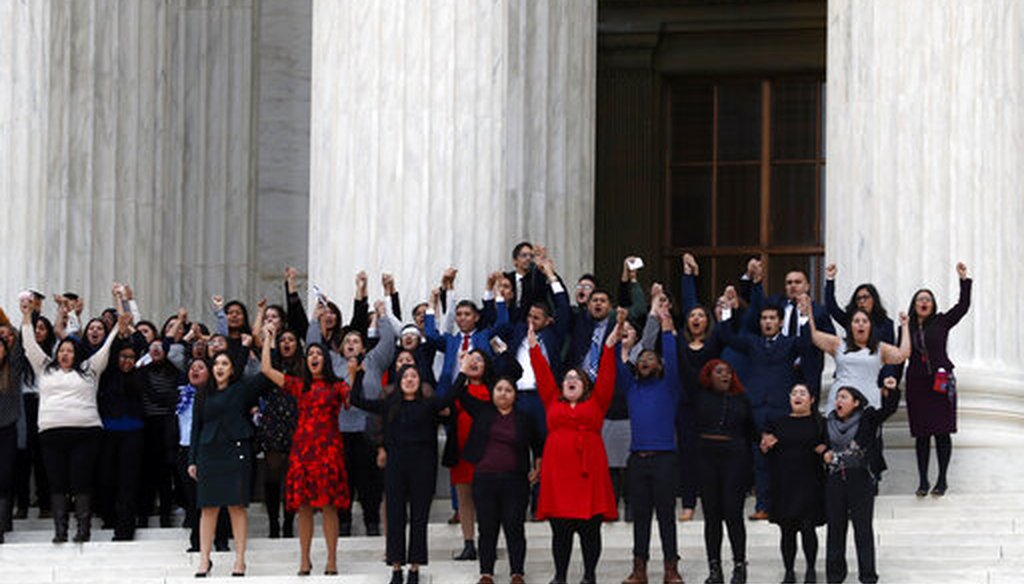

Our only agenda is to publish the truth so you can be an informed participant in democracy.
We need your help.


DACA recipients and others leave the Supreme Court after oral arguments were heard in the case of President Trump's decision to end the Obama-era, Deferred Action for Childhood Arrivals program (DACA), Nov. 12, 2019. (AP/Jacquelyn Martin)
Hours before the U.S. Supreme Court heard arguments on whether the Trump administration lawfully decided to wind down Deferred Action for Childhood Arrivals, President Donald Trump claimed that some immigrants in the Obama-era immigration program are criminals.
"Many of the people in DACA, no longer very young, are far from ‘angels.’ Some are very tough, hardened criminals," Trump tweeted Nov. 12.
Later, Trump also tweeted: "DACA recipients with arrest records: 53,792! That is a very large proportion of the total."
Immigrants with significant criminal backgrounds are not eligible for the program, so we wanted to look into Trump’s claims more deeply.
The Obama administration started the DACA program in 2012; the most recent numbers show that about 660,880 people (on average in their mid 20s) were protected from deportation under the program. Immigrants are ineligible for the program if they have been convicted of a felony, a significant misdemeanor, or three or more misdemeanor offenses. They also cannot be deemed a threat to national security or public safety.
RELATED: Did Obama say he didn't have the right to issue DACA?
Most immigration attorneys are "exceedingly cautious" about letting individuals with anything but minor criminal offenses apply for DACA, said Ming Hsu Chen, an associate professor of law at the University of Colorado in Boulder.
"This is because they will not only not qualify, but they will put themselves at risk of immigration enforcement, having turned over a substantial amount of personal identity/biometrics information to the government," said Chen, who was a signatory to an amicus brief from immigration law professors urging the Supreme Court to protect DACA.
Neither the White House or Trump’s re-election campaign provided on-the-record comment. However, U.S. Citizenship and Immigration Services, or USCIS, which reviews DACA applications, sent PolitiFact data on terminations and the arrest history of applicants.
None of this data shows that immigrants with significant offenses are enjoying DACA protection.
We found that in a five-year period, officials ended about 2,130 DACA protections. The majority of the terminations were for arrests or convictions unrelated to gang activity; fewer than 70 terminations were related to gang membership or affiliation, and they did not involve convictions or arrests.
The government also provided data on approximately 889,000 people who applied for DACA. Of this group, 53,792 (the number Trump tweeted) had an arrest before their application was approved.
The top three offenses for those arrests were driving-related (excluding DUI), immigration-related (such as visa overstays), and "theft, larceny, etc."
The federal government said an arrest indicates that the individual was arrested or apprehended only, and does not mean the individual was convicted of a crime. They may not have been charged with a crime resulting from the arrest, may have had their charges reduced or dismissed, or may have been acquitted.
Immigration experts told PolitiFact they were not aware of data on convictions of current DACA recipients.
"There is little to no publicly available empirical data to suggest that DACA recipients are ‘tough, hardened criminals’," said Tom K. Wong, an associate professor and director of the U.S. Immigration Policy Center at the University of California, San Diego. The government’s arrest data should not be taken to imply guilt or a conviction, he said.
If DACA recipients have become "hardened criminals," Chen said, they would be ineligible for renewals at two-year intervals.
Trump said, "Many of the people in DACA, no longer very young, are far from ‘angels.’ Some are very tough, hardened criminals."
Federal guidelines prohibit immigrants convicted of felonies, significant or numerous misdemeanors from enjoying DACA protection. Immigrants deemed to pose a threat to national security or public safety also do not benefit from the program.
No government data shows that immigrants are actively getting protection despite convictions for significant offenses, as Trump’s tweet suggested.
We rate Trump’s claim False.
Twitter, @realdonaldtrump tweet, tweet, Nov. 12, 2019
USCIS, Immigration and Citizenship Data - Data on DACA recipients, published Sept. 17, 2019
USCIS, Consideration of Deferred Action for Childhood Arrivals (DACA)
USCIS, DACA Terminations Related to Criminal and Gang Activity by Fiscal Year
USCIS, New Data Shows Criminal Arrest Histories of DACA Requestors, last reviewed/updated June 18, 2018
Immigration Professor Blog, Immigration Law professors file amicus brief defending DACA in Supreme Court, Oct. 4, 2019
Email interview, USCIS press office, Nov. 12, 2019
Email interview, Ming Hsu Chen, an associate professor of law at the University of Colorado in Boulder, Nov. 12, 2019
Email interview, Tom K. Wong, an associate professor and director of the U.S. Immigration Policy Center at the University of California, San Diego, Nov. 12, 2019
Email interview, Ramiro Martinez, professor at Northeastern University, Nov. 13, 2019
Email interview, Roberto G. Gonzales, professor of education at Harvard Graduate School of Education, Nov. 12, 2019
PolitiFact, Jeff Sessions' questionable claim that DACA helped cause spike in minors at border, Sept. 5, 2017
In a world of wild talk and fake news, help us stand up for the facts.
